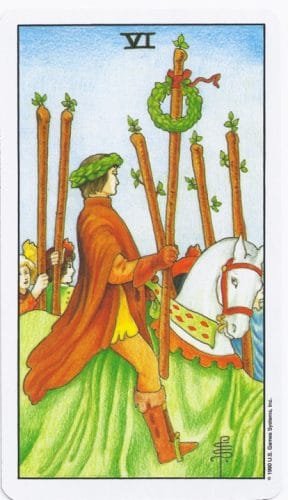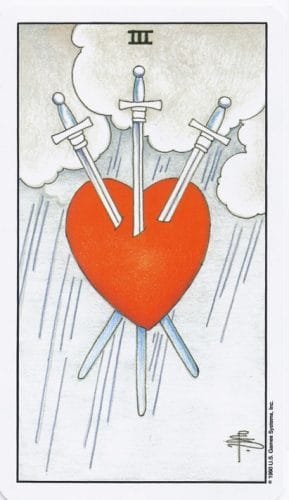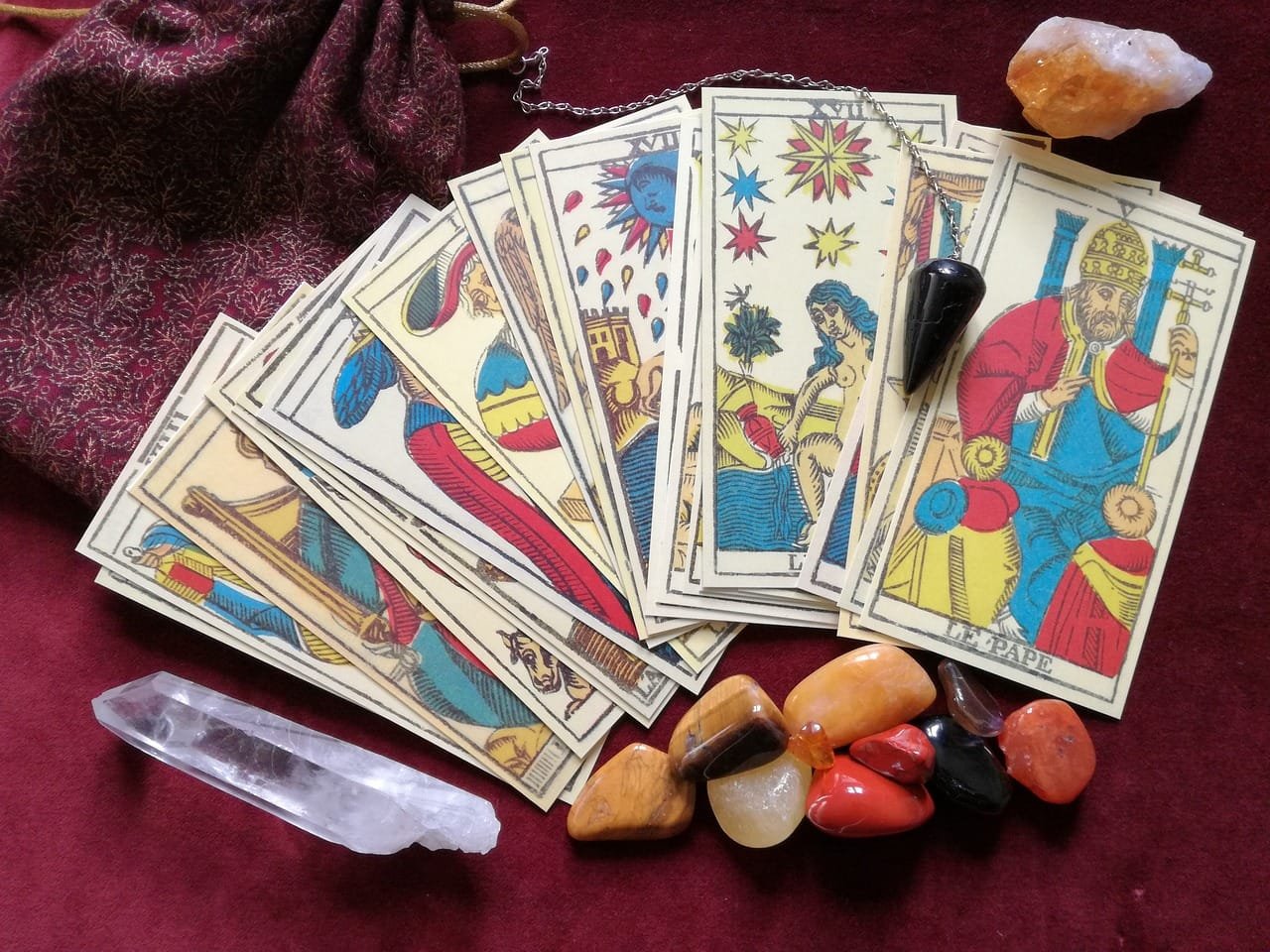When you do a Tarot Card Reading, you lay the cards in a Spread. And a Spread is made up of a number of Positions. Occasionally you’ll end up with getting positive cards in a negative spread position, and negative cards in a positive spread position. This is most probably because the cards have a wacky sense of humor. ?
Let’s see how we can make sense of these combinations, and do an excellent reading for our clients!
What I mean by ‘Positive’ and ‘Negative’ Cards
As such, every Tarot Card is a mix of the good and the not-so-good stuff. The card imagery always contains a well-rounded mix of perspectives of the situation that they are depicting. However, most cards will tilt a little bit towards a particular side, giving them a mostly ‘Positive’ or a mostly ‘Negative’ flavor.
Let me explain with a couple of examples.
6 of Wands

This card shows a young man riding a horse and leading a group of people. He wears a laurel wreath, and his and is also decorated with one. His overall demeanor is one of confidence and leadership.
The keywords associated with this card are: success, leadership, leader, victory.
On the flip side, you may even say that he invites jealousy because of who he is and what he does. That is the slight negative bit that the card imagery shows.
But you can see that the card is mostly a ‘Positive’ card.
5 of Cups

In this card, we see a young man standing on the river bank, wearing black, his back turned to us. He seems to be looking at the 3 overturned cups that are lying in front of him. He gives the impression of being sad and gloomy, especially over relationships that have gone sour.
The keywords for the card are sadness, depression, grief.
On the flip side though, we see that he’s still got two upright cups (symbolic of at least one good relationship), but he can’t see them. He also has a bridge that he can cross over that ‘River of Tears’ and go to the castle / home, that represents sanctuary.
But, as you may have noticed, this card has a very ‘Negative’ tone.
We Can See That…
We tend to see the cards as having either a ‘Positive’ or a ‘Negative’ tone. This doesn’t have to be a perspective to hold on to, but it can deeply impact the way these cards are interpreted in a Tarot Reading Spread.
‘Positive’ and ‘Negative’ Spread Positions
Just like the cards, spread positions can also be seen as positive as negative. Again, let me explain with examples.
‘Positive’ Spread Positions include: Guidance, Advice, What Helps, What To Do, etc.
Essentially, they either depict favorable situations or offer helpful guidance.
‘Negative’ Spread Positions include Avoid, Hidden, What Harms, What Not To Do, etc.
These essentially are all about the unfavorable situations, and about what isn’t working.
The Mismatch

The trouble shows up for many readers when you get a mismatch between the card and the spread position.
So, for example, when a ‘Negative’ card like 3 of Swords, for example, shows up in a ‘Positive’ position like ‘Advice’, you find yourself wondering what is going on! You wonder if the cards are somehow wrong, or you ended up pulling the wrong card by mistake… the number of things that come up can be endless!
A Mindset Shift
However, the cards never come up wrong! They’re there because they were meant to be there, and they are supposed to tell you their message.
You just need to change the way you approach this perceived mismatch in the card combination.
Shift your mindset a bit, and approach the combination from a place of confidence rather than fear. If you see such a mismatch and are at once upset or worried or anxious — anything but feeling confident about interpreting what’s shown up — you are bound to doubt what you are trying to figure out.
In order to approach this without any preconceived notions, fear, prejudice, confusion, anxiety, doubt, or any similar versions of emotions, you need to stop seeing this as something ‘wrong‘, but rather as something ‘interesting‘ or ‘challenging‘.
For instance, I choose to see it as an interesting puzzle that now needs to be solved! ?
Interpreting The Cards
Once you’ve shifted your mindset from a confused fear-based approach to a more positive, curious and eager approach, right away you will sense that the energy within you has changed. It will almost feel like a fog was lifted, and now you can see a clear path ahead.
After you’ve cleared your perception, you need to approach it in a very simple, step-by-step manner.
Step 1: The Card Keywords/Key Phrases
This is important. Having a list of at least 1 to 3 keywords/key phrases associated with each card comes in handy at this point. You can easily find many such lists online. But I suggest that you make a list from scratch for yourself.
If you spend some time and make this list of keywords for yourself, you will likely remember it better. And that is what you want.
You want to be able to say the keyword/key phrase of the card as soon as you see turn it over in your spread and see it.
A great way to create your keywords is to use the Card-Story approach — thus linking the keywords to the card’s imagery. This makes it easy to remember the keywords because the card’s imagery is going to spark that memory for you!
Step 2: The Spread Position
The Spread Position is usually pretty self explanatory. You only need to know the name to understand/grasp what you are supposed to learn from there.
Step 3: Combine Steps 1 & 2
This one is simple: combine steps 1 and 2!
For example, if you get the 6 of Wands card in the ‘Avoid’ position, you can say something like: “You need to avoid taking charge and leading the team.”
And boom! You’ve got the answer.
Or, if you get the 5 of Cups in the ‘What To Do’ position, you can say something along the lines of: “What you need to do is allow yourself to grieve what is lost.”
And, in our very first example of 3 of Swords in the ‘Advice’ position, you can work it out as: “You need to allow yourself to feel the heartbreak/betrayal deep inside of your heart, in order for you to feel the pain. That is the only way you’ll be able to let go and move on.”
Getting Better At It
Although simple, with this approach, if you keep working with it, you’ll see results soon enough.
Start simple. And build your confidence as you keep working with this method. Then, as your fear dissolves and you relax, you’ll find yourself talking more because your intuition will also chime in with more information.
So, in the first example (6 of Wands in the Avoid position) you could end up talking about how taking charge of the team may invite jealous actions from the team members, which may end up ruining your relationships with these team members.
Or in the second example (5 of Cups in the What to Do position) you could end up talking about how after he’s allowed himself to grieve what is lost, he can turn around to discover that he still has someone that cares for him deeply — he just never noticed it.
And in the third example (3 of Swords in the Advice position) you will be able to tell the client that the deeper he feels the pain of the hurt, the clearer he will be able to see how that betrayal actually took place, and it will help him identify the triggers and the processes and the methods in which this incident happened. And this knowledge will help him immensely in the future.
If you recall the flip side meanings of these cards, you’ll see where the additional stuff came from. ?
Video Tutorials with Examples
Of course, I’ve made a couple of videos where I’ve shown how to do this very thing. These are live examples that will help you understand this process better. So do take some time and watch them! ?
Your Turn…
I would love to hear about your experiences and approaches towards such situations! What do you do when you see such cards show up in these spread positions?
Or if you’ve tried out this method, tell me if it helped you at all. Did you tweak it a bit? Did you have any interesting examples to share?
Please, talk to me in the comments section below, and share!! I would love to hear what you have to say!! ?

